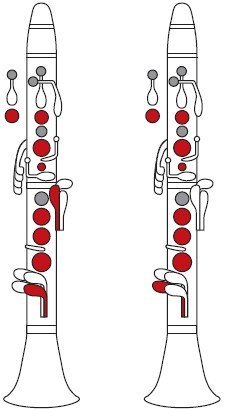As a clarinetist, you might often find yourself exploring various scales, but few carry the historical significance and musical beauty of the F# Melodic Minor Scale. This scale, cherished by composers and performers alike, is more than just a series of notes; it's a cornerstone in the musical world, particularly for the clarinet. Its distinctive qualities have sparked inspiration for countless pieces over time, influencing how we play and interpret clarinet music today.

Clarinet Fingering Charts are always FREE at MartinFreres.net!
The Composition of F# Melodic Minor Scale
The F# Melodic Minor Scale is composed of the notes F#, G#, A, B, C#, D#, and E#. What makes this scale intriguing is its distinct ascending and descending forms. As it ascends, it features a raised sixth and seventh, creating a brighter sound compared to its natural form. However, when descending, it reverts to the natural form, like most melodic minor scales. This duality makes it a flexible tool for musicians aiming to convey a range of emotions.
Historical Context and Significance
The scale gained prominence during the Romantic period, an era rich with emotion and innovative artistic expression. Renowned composers such as Franz Schubert and Johannes Brahms frequently employed melodic minor scales to evoke specific feelings in their works. As the clarinet rose to prominence as an expressive solo instrument, the F# Melodic Minor Scale found its way into numerous clarinet concertos and chamber pieces. Picture a clarinetist, fingers gracefully moving across the keys, weaving through this scale, stirring emotions from melancholy to joyous excitement!
| Composer | Notable Work | Period |
|---|---|---|
| Wolfgang Amadeus Mozart | Clarinet Concerto in A Major, K. 622 | Classical |
| Franz Schubert | Various chamber works | Romantic |
| Johannes Brahms | Clarinet Sonatas | Romantic |
Mozart's Clarinet Concerto: A Prime Example
One of the most prominent works featuring the F# Melodic Minor Scale is the Clarinet Concerto in A Major, K. 622 by Wolfgang Amadeus Mozart. The intertwining melodies and harmonies exemplify how composers utilized this scale's expressiveness in their compositions. The concerto's lyrical passages echo the intimate dialogues often achieved through the clarinet, showcasing how the F# Melodic Minor can beautifully enhance melodic lines.
Developing Skills with F# Melodic Minor Scale
The F# Melodic Minor Scale is an excellent tool for clarinetists looking to hone their skills. Practicing this scale not only improves technical proficiency but also encourages musicians to experiment with various articulations and dynamics. Consider the range of emotions that can be conveyed through the scale's rise and fall! The smooth transitions between notes can reflect the flow of a heartfelt conversation, drawing listeners into an emotional journey.
Educational Value for Clarinet Students
For clarinet students, exploring compositions that utilize the F# Melodic Minor Scale can be incredibly valuable. It's an excellent subject for lessons, opening up discussions about historical context, performance practices, and expressiveness. Teachers should motivate students to listen to renowned recordings of pieces incorporating this scale, allowing them to absorb its inherent beauty.
Modern Applications of F# Melodic Minor Scale
The F# Melodic Minor Scale continues to be relevant in contemporary compositions. Modern composers often draw upon its emotive power, incorporating it into various genres, including jazz and orchestral works. By embracing this scale, musicians can craft unique soundscapes that connect with audiences, demonstrating how historical elements remain pertinent in today's musical landscape.
The Impact of Quality Instruments
The contribution of brands like Martin Freres in showcasing the F# Melodic Minor is significant. Their clarinets, crafted for discerning musicians, enable enhanced expression and fluidity across various scales. These instruments embody the passion and history of the clarinet family, equipping players with the means to fully explore the scale's emotional range.
Conclusion: More Than Just a Scale
The F# Melodic Minor Scale is far more than a technical exercise; it's a portal into the clarinet's expressive capabilities. By studying this scale's historical importance, musicians can gain a deeper appreciation of its substantial impact on clarinet music, whether they're practicing melodies, performing concertos, or composing original pieces.
So, fellow clarinetists, grab your instruments and try out the F# Melodic Minor Scale! Experience its natural flow, and let its rich history inspire your musical adventure.
Table of Contents
- The Composition of F# Melodic Minor Scale
- Historical Context and Significance
- Mozart's Clarinet Concerto: A Prime Example
- Developing Skills with F# Melodic Minor Scale
- Educational Value for Clarinet Students
- Modern Applications of F# Melodic Minor Scale
- The Impact of Quality Instruments
- Conclusion: More Than Just a Scale








